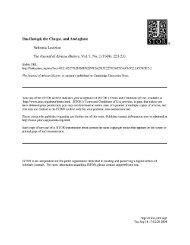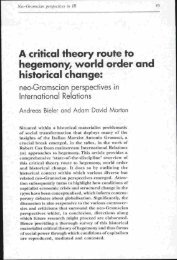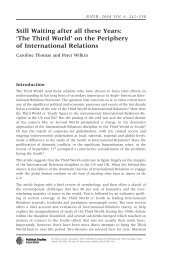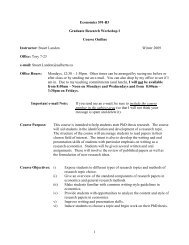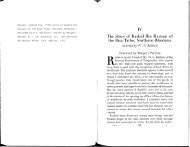Is comparative politics dead? Rethinking the field in the post-Cold ...
Is comparative politics dead? Rethinking the field in the post-Cold ...
Is comparative politics dead? Rethinking the field in the post-Cold ...
You also want an ePaper? Increase the reach of your titles
YUMPU automatically turns print PDFs into web optimized ePapers that Google loves.
HOWARD J WIARDAbureaucratic±statist and often highly politicised or militarised model rema<strong>in</strong>s <strong>in</strong>place that has <strong>in</strong>hibited economic growth. Politically, much of <strong>the</strong> <strong>Is</strong>lamic worldis still dom<strong>in</strong>ated by authoritarianism and a top-down model of political control;only <strong>in</strong> a handful of countries (Jordan, Iran, Kuwait) have even <strong>the</strong> earliest andquite limited forms of political open<strong>in</strong>g taken place. In addition, <strong>the</strong>re are strong,ongo<strong>in</strong>g efforts to fashion a dist<strong>in</strong>ctly <strong>Is</strong>lamic model of development as analternative to <strong>the</strong> Western oneÐ one that, as <strong>in</strong> Africa, is beset by dif® culties. 36It is perhaps no co<strong>in</strong>cidence that <strong>the</strong> <strong>Is</strong>lamic world constitutes one of <strong>the</strong> ma<strong>in</strong>cases <strong>in</strong> Samuel P Hunt<strong>in</strong>gton’ s recent writ<strong>in</strong>g on `<strong>the</strong> clash of civilisations’ . 37Hence, <strong>in</strong> virtually all global areas (sub-Saharan Africa and <strong>the</strong> <strong>Is</strong>lamic worldare <strong>the</strong> major exceptions), we have seen <strong>in</strong> recent years a signi® cant gravitationtowards more open political and economic systems. The ma<strong>in</strong> alternatives ofMarxism±Len<strong>in</strong>ism and corporatism±authoritarianism have been uprooted andlargely discredited; only democracy and free markets (usually comb<strong>in</strong>ed withwelfarism and some form of statism) now enjoy widespread legitimacy. It maybe democracy or free markets with adjectives (controlled democracy, tutelarydemocracy, delegative democracy, limited democracy), but it is democracynone<strong>the</strong>less; even <strong>the</strong> adjectives seem to re<strong>in</strong>force that it is only democracy thathas legitimacy. The precise mean<strong>in</strong>gs of democracy and free markets may varysomewhat but <strong>in</strong>creas<strong>in</strong>gly, <strong>in</strong> grand systems terms, <strong>the</strong> <strong>politics</strong> of compromiseand pragmatism has replaced <strong>the</strong> <strong>politics</strong> of ideological ei<strong>the</strong>r or. All of thissuggests, with immense implications for <strong>comparative</strong> <strong>politics</strong>, that <strong>the</strong> greatsystems debates of <strong>the</strong> past are largely over. And <strong>the</strong> ® eld is somewhat lessexcit<strong>in</strong>g because of <strong>the</strong>se transformations. After all, what is <strong>the</strong>re to compare ifso many goals, policies and <strong>in</strong>stitutions are so similar?Future research terra<strong>in</strong>sIt is <strong>the</strong> contention of this paper that, with <strong>the</strong> eclipse if not disappearance of <strong>the</strong>great systems debates of <strong>the</strong> past, <strong>comparative</strong> <strong>politics</strong> as a ® eld has become bothless <strong>in</strong>novative and less entic<strong>in</strong>g. What attracted many persons to <strong>the</strong> ® eld <strong>in</strong> <strong>the</strong>past was <strong>the</strong> sense that all options were open, all system possibilities debatable.But now democracy has overwhelm<strong>in</strong>gly triumphed <strong>in</strong> <strong>the</strong> political realm and, toa somewhat lesser extent, neoliberalism (and its various modi® ed forms) <strong>in</strong> <strong>the</strong>economic. In terms of <strong>the</strong> personal belief systems of scholars of <strong>comparative</strong><strong>politics</strong>, this outcome may or may not be laudable; but <strong>the</strong>re is no doubt that ithas also served to dim<strong>in</strong>ish <strong>in</strong>terest <strong>in</strong> <strong>the</strong> ® eld. As more and more countrieshave become `normal’ countriesÐ that is, conform<strong>in</strong>g to <strong>the</strong>se political andeconomic models as givensÐ <strong>the</strong>y have also become more bor<strong>in</strong>g, <strong>in</strong> <strong>the</strong> senseof hold<strong>in</strong>g less <strong>in</strong>terest for those who were or are attracted to <strong>the</strong> ® eld preciselybecause of its attention to grand systems debate.But to say that <strong>the</strong> large systems issues of <strong>the</strong> past have ma<strong>in</strong>ly been resolvedat this stage <strong>in</strong> favour of democracy and open markets is not, of course, to arguethat <strong>comparative</strong> <strong>politics</strong> as a ® eld is <strong>dead</strong>. The changes outl<strong>in</strong>ed here away from<strong>the</strong> grand systems debates of previous decades force us to reorient <strong>the</strong> ® eld butnot to abandon it. In fact, <strong>the</strong>re is a host of <strong>in</strong>terest<strong>in</strong>g issues for students <strong>in</strong> <strong>the</strong>® eld to exam<strong>in</strong>e; herewith a partial list.944



